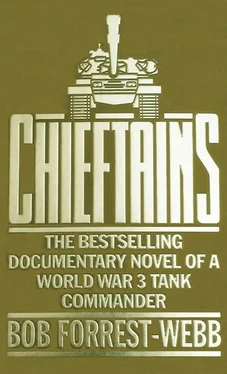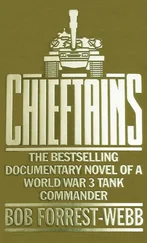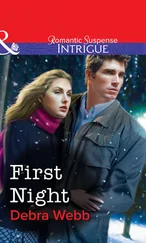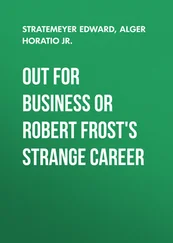‘Hullo Charlie Nine this is Black Dog… target, over…’ An infantry request to Davis for support.
He replied, ‘Charlie Nine, send, over.’
‘Black Dog… missile launcher moving into position… your gun barrel two o’clock northern edge of poplars. Will fire burst for your reference, watch for tracer. Over.’
‘Charlie Nine, wilco. Out.’
‘Got your eyes on the position, Inkester?’ Davis watched the left end of the poplars. A few seconds later he saw a line of tracer bullets pass between the first and second of the distant trees, towards the ruins of a small farm building. ‘Okay, let’s get on it’ Inkester brought the gun round and Davis saw the building in the sights. Inkester’s first round exploded, but even with the ten times magnification Davis was unable to see the result.
‘Hullo Charlie Nine, this is Black Dog. Left twenty reduce fifty, over.’
‘Charlie Nine, wilco. Out.’ The miss had been due to the difficulty in calculating the exact target of the tracers fired from cover away to the Chieftain’s left. Davis made the necessary corrections. He enjoyed working with the infantry, it was like playing to an audience. The Chieftain lurched as Inkester fired again, and this time the explosion of the shell was more spectacular.
‘Hullo Charlie Nine… this is Black Dog… you are on target, out.’
On target. One more kill, thought Davis, coolly reported as if it were a dummy on a range.
‘Tank,’ shouted Inkester.
Davis had seen it simultaneously. ‘Zulu, this is Charlie Nine… T-62 eleven o’clock, am engaging, out’
‘Zulu, roger. Out.’
The smoke ahead was denser now, but Davis could still see the outline of the first tank as Inkester lined it up and fired.
The attack, fiercer and more determined than Davis had experienced in the past days, lasted almost four hours before dying away. But, for the first time, all the NATO tanks had remained in position and there was no withdrawal. Squadron after squadron of Soviet armour and mechanized infantry had hurled themselves against the NATO line and been repulsed. Ahead of Davis the smoke fog was drifting away towards the north-east, unrolling the devastated landscape of the battlefield in front of him, uncovering the obscene carcasses of wrecked vehicles, the corpses of men.
Inkester shouted a wild, jubilant cheer.
‘We’ve beaten them off, sir…’ There was enough of Spink’s face visible through the eye-pieces of his mask for Davis to know the loader was grinning.
Davis just nodded. He had learnt too much in the past days to be anything but cautious in his hopes. He was feeling satisfied that the line had held, but knew it must have been as costly for the NATO forces as for their enemies.
He checked his troop on the network. There were no casualties, and the feeling of relief warmed him further. There might well be losses amongst the squadron, but at least he had managed to keep his own team intact. Team. With dismay he realized his original intention to avoid establishing close ties with his replacement crews was already falling apart. He knew it was a weakness he might well regret.
The sky had brightened and the cloud was now broken so that patches of sunlight drifted across the open ground, chasing the columns of dark smoke spiralling from the battle debris. He could see only one living being amongst it all; four hundred meters away a solitary Russian infantryman, still wearing his mask and protective clothing, wandered aimlessly in the open. Others must have seen him, but none fired. After a few minutes the soldier turned and stumbled slowly away until he was lost in the distance, a lonely bewildered man, perhaps demented, insane. The medical officers called it battle-fatigue.
‘What are the Russians up to, sir?’
‘Inkester, you must have been a bloody aggravating kid!’ Davis leant back in his seat. To his right, through his episcope, he could see the sector at the rear of the NATO defence lines, sparsely wooded country that was little more than a long sweeping plain until it met the outskirts of Hannover some forty kilometers away. He deliberately allowed his thoughts to drift, encouraging them away from the jaggedness of war, using memories to soften reality. He was with Hedda and the boys at Hamburg Zoological Gardens. The afternoon was warm, the children sticky-handed and the animals lethargic. The children were more interested in a playground than the animals; he and Hedda sat in the shade while the children exhausted themselves, shrieking and laughing. He couldn’t remember how many Cokes he had bought, it seemed like a dozen, plus an equal number of ice-creams. When they had returned home the exhausted children were pleased to get to bed, and Hedda had brought him a beer on the apartment balcony. It had been a happy day, a family day, and the evening was good, too. It was satisfying just sitting there, drinking the beer and hearing Hedda prepare supper, knowing the kids were asleep in their room. It was the best part of being a father, a husband. Hedda had been in a loving mood; it had been a good day, all round. There were others like it to think about.
His eyes were half-closed and he was almost asleep. There was a sudden bright glow of light which penetrated his eyelids like the burst of a photographic lightbulb; he could feel intense heat on his cheeks. The light did not die away but increased rapidly until pain forced him to react. He ducked. The interior of the Chieftain was lit by sharp-edged beams flooding through the vision blocks in the turret.
The twenty kiloton nuclear warhead of a Soviet SS-1 Scud missile exploded close behind the NATO front line, its skyburst destroying all unprotected living things beneath it for an area of two and a half square miles.
Davis’s mind had grasped and interpreted the brief warning. He attempted to shout but no sounds would come from his throat. For the first time in his life terror completely overcame him. He tried to scream to dispel the agonizing fear which twisted at his intestines, but his years gagged him.
The silence broke with the sudden roar of the pressure wave which lifted the stern of the Chieftain’s fifty-two ton hull three meters from the ground, tilting the bow against the embankment until the tank was near vertical, the muzzle of the gun driving deep into the earth as the crew were hurled forward on to the instruments and controls.
The flame-blackened debris of uprooted trees, shrubs and buildings blasted past. The Chieftain’s hull dropped, the suspension units shearing from their mountings as it bounced crazily.
A second vast concussion, the implosion, spun the tank sideways as though it were weightless, shaking it like a dog with a rag before discarding it, the thunderous roar dying only slowly.
The terror remained with Davis; it was night outside the Chieftain, swirling dust clouds thicker than the densest battle-smoke. The ground beneath the tank was no longer solid, quivering, rippling as it transmitted the shock of more distant nuclear explosions.
Spink, supporting himself against the breech, managed to switch on the fighting compartment lights; fine dust and fuel droplets haloed them in miniature rainbows until the wiring shorted and the tank was in darkness again.
He had seen Morgan Davis briefly; reaching forward to pull Inkester back into his seat. The gunner’s head, his respirator torn away by impact with the sharp edges of the Chieftain’s equipment, was cut and bleeding; his eyes were wide, staring like those of a hare cornered by a dog.
‘Hewett… Spink?’ Morgan Davis shouted the men’s names, his voice urgent. There was a burst of red flame neat the ammunition locker. Spink tried desperately to open the hatch above him, but the hatch lever was jammed. He heard Davis again: ‘Hang on, lads… it’s over… it’s all bloody over!’
Читать дальше












